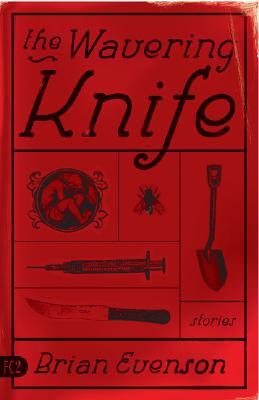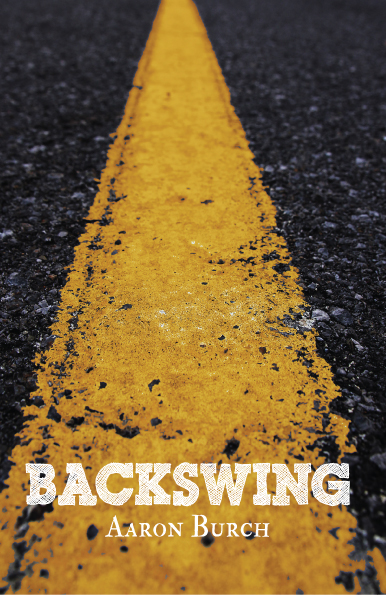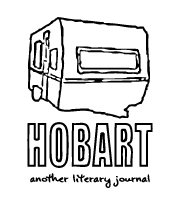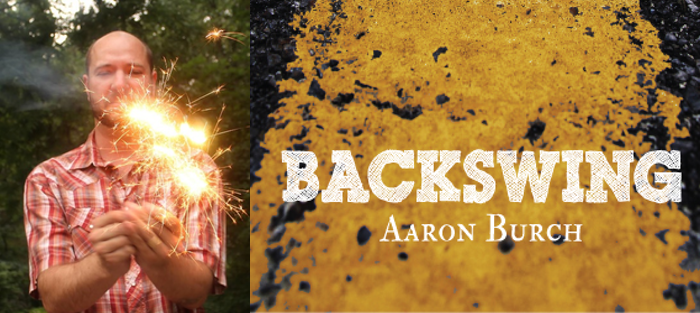I officially first met Aaron Burch in his role as editor of the literary magazine Hobart, but by then we’d already been hanging around the same parts of the Internet for a little while. This was 2004 or 2005, and we were both sharing stories and writing critiques and frequenting the message boards at Zoetrope.com, an online writer’s workshop. The same week Aaron first took a story of mine for Hobart—one of my first stories to appear in print—I put up a message at Zoetrope looking for the two back issues of McSweeney’s that contained the first two acts of Denis Johnson’s play “Soul of a Whore,” which was being serialized in the magazine: I’d just started subscribing, and so only had the third act. Another Zoetrope member, Elizabeth Ellen, wrote to offer to sell me the issues—then immediately wrote me again, offering to send them to me for free, since she’d just realized her boyfriend had accepted a story of mine. Once again, Aaron Burch of Hobart was there to help.
It would be a couple years before I’d move to Ann Arbor, where Aaron and Elizabeth lived, which allowed us to take our online friendship into real life. I lived there for five years, during which we shared writing groups and bar tabs and plenty of conversations about books and writing. Eventually, Aaron and I started our MFA studies at the same time, moving away from Ann Arbor in different directions: he went to the University of Illinois in Urbana-Champaign, and I commuted to Bowling Green in Ohio. And then, after we were finished, we came back to write and work in Ann Arbor again.
As Aaron has built his own writing career, Hobart and its book arm, Short Flight/Long Drive Books, have also continued to increase in stature: started as an online journal over ten years ago, Hobart‘s print journal has placed stories in Best American Short Stories 2012 and The PEN/O. Henry Prize Stories 2013, and SF/LD has published well-reviewed books by writers like Mary Miller, Michelle Orange, Adam Novy, Karl Taro Greenfield, Dylan Nice, and Chelsea Martin. One of the aspects of being an editor at a small press sometimes means letting your own work take a backseat, especially if you’re trying to get your writers the attention you think they deserve, and this is true of Aaron as well, who graciously gives more of his public attention to his writers than to himself. But this hasn’t stopped Aaron from steadily being published in great magazines, places like New York Tyrant, Barrelhouse, PANK, and Unsaid, among others, or from publishing several short volumes of work: the novella How to Predict the Weather; the chapbook of short fiction How to Take Yourself Apart, How to Make Yourself Anew, winner of PANK’s First Chapbook Competition; and the poetry chapbook Between Buffalo and Bison, forthcoming from Publishing Genius Press.
In July, Queen’s Ferry Press will publish Aaron’s debut full-length story collection Backswing. I’m tempted to say that his stories frequently cross expected boundaries, but it’s more that—like the stories Aaron often takes for Hobart, they often simply do not recognize that such boundaries exist: they are simultaneously funny and serious, realist and fantastical, ironically distant and deadly sincere. It’s disarming to see a first collection with such range, and impressive to see one that refuses to choose sides in any of these “debates,” when instead a writer might aim to play from every angle, taking every advantage available along these spectrums of artistic choice.
Interview
Matt Bell: I’ve been trying to get a fix on the time span over which you wrote these stories: I can remember reading an early draft of “Prestidigitation” in 2008 or so, when you and I were in a writing group together, right before we began our MFA programs. Though it might have been slightly after, too, as I know we sometimes met when you were visiting. Are there stories here that predate that period? A lot has happened to you both personally and artistically in the six years or so since those first stories were written, and I’m curious about how that impacted your collecting the stories into one book. How did you bring all these stories into a single manuscript, ranging from a sort of domestic story with a twinge of weirdness (“Scout”) to work engaged in the kind of memory and language play that always make me think of Brian Evenson (“The Stain”)? What was your approach to selection and order?
Aaron Burch: Yeah, the stories span a lot of years. Looking at the book, I guess I tend to write stories in chunks, and then either go through fallow periods or periods when I’m working on just revisions or other projects or whatever. The earliest is “Unzipped,” which was in PANK 4 [September 2009], but the first draft was probably composed a few years before that. Then, working it over for inclusion here, it saw at least a couple more “more than just copyediting” drafts. I think that one’s the anomaly, though, and most are more recent. That said, all of them got at least a round of “clean up,” sometimes just to fix a small piece of old, bad writing, but other times to help bring them all together into a single manuscript—cutting go-to similes that got repeated across different stories; tweaking the language of something to make it nod toward, and hopefully complicate, another story.
My approach to selection and order was… you know: part highly scientific, part intuition, part asking friends for input, and probably part happy accident.
The rule of thumb, whether most authors do so or not, is to put the “best” story first, right? “Scout” is definitely one of my favorites but, even more than that, I think it seemed like the best opener for the very reasons you point out: it’s a “sort of domestic story with a twinge of weirdness,” which I think is a good representation of the collection as a whole, and a nice entry point. My idea for the collection was always to try to make this wide variety of stories, which range from nearly completely “domestic” to the further end of non-realism, and everything in between, all feel like they were speaking to one another. We’ve talked about this a lot over the years—having it feel like a “book” and not “just a collection.” But it’s not a “novel-in-stories”; there’s not really recurring events or characters, and they’re pretty different kinds of stories. So, the first four stories are “Scout” (domestic with a twinge of weird), then “The Stain” (non-realist, engaged more in memory and language), then “Prestidigitation” (back to domestic with a twinge of weird, but pushing that weird to non-realism territory), and then “Flesh & Blood” (pure realism). Those four span distinct gradations from realism to non-realism, which means you’ve basically seen the range of the whole book in just the first quarter or so. And, hopefully, by the time you get to a story later in the book like “After the Leaving,” which is maybe even a bit more myth-based than most, you’re ready for it because you’ve already read echoes of its themes and tone in “The Stain,” but you’ve also read some more realism-based stories so hopefully feel even more connected to the actual people of the story than you might be were you to find it on its own in a journal.
I think that’s a really wise decision, to sort of give the bounds of the book early, then allow the rest of the book to fill in that shape even as it continues to complicate whatever expectations the book sets up. It seems to be that part of every book’s responsibility is to teach the reader how to read it, and this seems like as good a tactic as any. (I’d be really suspicious of a book that didn’t have to do that at all.) What kind of influences went into these stories, over the years? Were there particular books or authors that helped push you toward these different frontiers of what your short stories could be? Were they different books in the different “eras” of the book’s composition?
 As you note, and as we’ve talked about a bunch, Evenson is obviously a pretty huge influence. In part just because he’s a favorite and I love his writing so much, but also because what you might call an “Evenson story” seems about as far from the “domestic/relationship” stories that I sometimes slide into but want to jolt myself out of. So it was often helpful to almost give myself a kind of WWBED challenge.
As you note, and as we’ve talked about a bunch, Evenson is obviously a pretty huge influence. In part just because he’s a favorite and I love his writing so much, but also because what you might call an “Evenson story” seems about as far from the “domestic/relationship” stories that I sometimes slide into but want to jolt myself out of. So it was often helpful to almost give myself a kind of WWBED challenge.
In one of the latter eras of the book, I gave myself another (non-writing) challenge: read Cheever’s big, red “collected” book of stories over the course of a summer. And reading so much of his work couldn’t help but become an influence. So if Evenson at times challenged me to push myself out of familiar, “domestic” territory, Cheever then challenged me back in the other direction, away from what had then become kind of familiar territory of violence and darkness. (Or, toward a more suburban and understated violence and darkness, at least.)
There are lots of other influences, too, of course, through the different stories and “eras” in which they were written, some surely more evident in the stories themselves than others. But those two feel like maybe two of the biggest, looking back over the book.
Regardless of where the stories fall on the realism vs. non-realism spectrum, or how formally conventional or unconventional they are, most of the stories in Backswing revolve around relationships, often romantic relationships but sometimes dealing more with family dynamics or friendships. It feels like a debut collection is an interesting record, in that even if none of the stories are strictly autobiographical, it still exists as a sort of chronicle of a writer’s obsessions and interests over a certain period of time. I don’t want to ask too autobiographical of a question, necessarily, but do you find that the kind of relationships you’re interested in writing about have changed as you’ve aged?
I think so. I think it’d probably be silly to not acknowledge that these were written throughout, and influenced by, on-again/off-again relationships (as I bet would be true for the stage of life that most writers are going through while they’re working on that “interesting record” of their debut collection). That obviously filters into a number of the stories, but I didn’t want it to, and kind of had no interest in writing “relationship” or “breakup” stories, and I really fought it. But, you know, you can’t help it, right? And fighting it is probably what pushed me into what I’m happiest about with the stories, and the book overall. It made me write some of the weirder stories, pushing toward some of that Evenson territory we mentioned. But it also made me push to try to find ways to present these relationship stories that I would, as a reader myself, as a reader who doesn’t especially love relationship stories, find entertaining, and fun, and interesting. So, with each story, where’s that twinge of weirdness that “Scout” introduces from the get-go?
I love that question: “Where’s that twinge of weirdness?” In the classroom, I find that one of my jobs seems to be to point out the weirdest, most out there thing a student is doing, and then suggest they turn toward that impulse rather than away. We get so used to hiding our weirdness out in the world that I think sometimes we can stifle it a bit on the page. Were there any of these stories—or ones you eventually chose not to include—that you worried had gone too far in the other direction? Have you had stories that failed in the opposite way, where the “twinge of weirdness” is well established—perhaps it’s more than a twinge, at this point—but it’s the twinge of reality or recognizable emotion that won’t show itself?
I’ll say first, I do think that “twinge of weirdness” can be a helpful guide, but I also often think, relatedly, about there being a twinge of… awesomeness? Or fun? I interviewed Kyle Beachy once about writing and skateboarding, and he said, “Marty Murawski recently told me that his strategy when he goes out skating is to ‘do something that the little kid version of me would clap for.’” I think about that a lot with stories. Is this story doing something that the little kid version of me (or, to put it another way, “non-writer me”) would think is awesome? I think there’s something to that, and like you say, “we get so used to hiding our weirdness.” I also think we get used to thinking that fun things and “literary things” are, if not mutually exclusive, barely related. But I like stories that feature baseball and driving ranges, skateboarding and fireworks.
I think the stories in this collection that actually took the most drafts, that I really struggled the most to figure out, are probably the ones where I had a conceit first and was trying write toward that. Usually when that happens, those kinds of stories don’t last very long before being discarded. But I loved something about the magical realism element of the zipper in “Unzipped,” and the ark in “After the Leaving,” and maybe to a lesser degree, the stain itself in “The Stain,” that I just kept going. It took me way too many drafts of each to realize that there wasn’t really a “recognizable emotion” at all, much less to then try to find it.
What does it take for one of those conceit stories to come to life? What has to happen during the process to keep it from fading and being discarded? Is it something you can force, or is it just the luck of the draw?
 As with any kind of story, a little of both, I think. I want to say you can’t ever really “force” a story, that that just isn’t going to work. But then again nearly every story takes some kind of forcing at some point.
As with any kind of story, a little of both, I think. I want to say you can’t ever really “force” a story, that that just isn’t going to work. But then again nearly every story takes some kind of forcing at some point.
I think it really is just what you asked—they still have to find their own “twinge of reality or recognizable emotion.” Essentially, obviously, a story can’t just be clever. We all know that, and I don’t think anyone would describe something of their own as “just clever.” But I think we trick ourselves sometimes. Or, I certainly do, at least. “The sentences in this are interesting enough to make the whole story work,” I might tell myself. Or, “The subtext is what makes this story work, and I can’t make it any more obvious for fear of it being too explicit.” Elizabeth has definitely called me out on these sorts of rationalizations. Though I think I can be overly critical of things being explained, which probably comes from being an editor and often cutting those sections in stories for Hobart, meaning that I can go too far the other way and leave things so mysterious that there isn’t enough for the reader to grab onto. In part, this is probably because I’m fast-forwarding to being an editor and cutting those sections, so the stories don’t have them in the first place. But maybe that’s another excuse. I think I often just haven’t found the purpose behind a story yet, and instead of digging deeper and exploring some kind of actual emotion, I try to let myself off the hook by being proud of the conceit or the writing or whatever.
I’m not sure if that answers the question or just prescribes a number of ways for you to tell me why my stories don’t work.
Here’s a kind of funny story: one of my favorite stories of yours is “The Receiving Tower” [Willow Springs 65, 2010], and I specifically remembered it at some point, relatively early, in the drafting of “The Stain.” This story was also about language disappearing, and something about the language of the story and world of it felt maybe Evenson-influenced in a similar way to what I was trying to do. At the time, I was stuck with how to end “The Stain,” and I really liked how “The Receiving Tower” has that ending where everything just kind of goes missing, including the language of the story itself. So I basically just stole that and grafted it onto “The Stain.” But, looking back, I think that was essentially me trying to force it, trying to cheat and steal what worked for your story and apply it to mine so then mine would work, too. It wasn’t until a couple drafts later that I figured out that “The Stain” wasn’t really about things and language going missing, but also things emerging, reappearing, and was more circular, and then the story finally found its own footing and ending.
One of the most helpful suggestions you used to make to me and the others in our writing group was to say, “You could probably do one more draft,” almost regardless of the quality of the story or chapter in front of us. I’ve thought about that a lot over the years, and it’s something I frequently use to push myself: “Well, Aaron would say do one more draft, just to see if it could be better. And maybe it can be.” But it wasn’t just something you were saying, either, as you were pushing your own stories hard, and holding on to them longer than other writers might have. How has your approach to revision changed over time? Are there certain stages you know a story has to go through before it’s ready to submit?
You know, you’ve said some version of this a bunch over the years and… I think you’re giving me too much credit. It kind of just sounds like advice you give someone when you don’t have anything else smart or specific or especially helpful to say.
And while I like to think I’m this dedicated writer who is super hard on himself, I think I’m much lazier than this question suggests. I send out stories all the time, way before they’re ready. I call things “good enough” when I know they probably need not just another draft or two but three or six.
I think part of the reason these stories got held on to was just because they kept getting rejected. Or I’d get busy with Hobart or teaching or whatever and just let pieces sit around, let myself be lazy with them.
That said, looking back at the stories now, I can remember rough draft versions of a lot of them, and I can see why those versions didn’t work and these do (or, I think they do, or hope they do, or whatever). I can kind of see how I hadn’t figured out where the story actually was, or why one POV might work where another didn’t. But this is all hindsight. The process itself was always just trying something new and seeing if it felt right. (And often feeling like it did, being happy with it, sending it out, getting rejections, sitting on the story, forgetting about it, finally going back and having an idea for a new beginning point, or ending, or POV, etc.)
Does your editorial work factor into the process at all? In other words, how often do you find solutions to the problems in your own work in stories you’re editing for Hobart? I remember starting editing at Dzanc and immediately diving in and working on novels, despite then having never finished one myself, and helping writers select and organize their collection, even though my own first collection was just coming out. That was sort of daunting, but also educational: some of what I know about novel-writing, especially, came from getting to talk over someone else’s with that editorial level of attention. Are there any specific lessons you can think of that might have come out of your editorial work, either at the story level or the book level?
I think editing Hobart has helped me immensely with my own writing, though I don’t think I even know or could say how as explicitly as you might be able to. I know it has helped, but not sure I have any specific lessons.
Trying to think of how to answer, I can think of two anecdotes:
 First, remembering back to those first few years of Hobart, and as you said about editing novels before you’d finished one yourself, it seems ridiculous now that people were sending me/Hobart stories at all. I didn’t really know what I was doing, had no “experience,” and had just decided to call myself an editor. But in addition to offering me this experience, I also remember it having the opposite effect of being helpful; I think it gave me a little paralysis, in that I was reading and judging all these submissions, and would get tired of seeing this cliché or that one, and would too quickly judge my own first drafts against the final drafts of submissions (“Ugh, another story starting with an alarm clock,” or, “Oh no, not another father/son story”), and I’d give up and quit that story before just letting it be what first drafts are: kinda shitty, full of clichés, etc.
First, remembering back to those first few years of Hobart, and as you said about editing novels before you’d finished one yourself, it seems ridiculous now that people were sending me/Hobart stories at all. I didn’t really know what I was doing, had no “experience,” and had just decided to call myself an editor. But in addition to offering me this experience, I also remember it having the opposite effect of being helpful; I think it gave me a little paralysis, in that I was reading and judging all these submissions, and would get tired of seeing this cliché or that one, and would too quickly judge my own first drafts against the final drafts of submissions (“Ugh, another story starting with an alarm clock,” or, “Oh no, not another father/son story”), and I’d give up and quit that story before just letting it be what first drafts are: kinda shitty, full of clichés, etc.
Second, when working the Hobart table at bookfairs, one of my go-to responses when people compliment the look of the journal and books is to say that my last day job, before going back to grad school, was at a book printer. On the one hand, it was “just” another customer service job; on the other hand, I was around books all day, constantly seeing what files people were sending us, what the completed books look like. And I was constantly aware of what kinds of things caught my eye—different designs, different kinds of extras like stamped foil or spot gloss lamination—and I think that went a long way toward reminding me what could be done and what kinds of things drew my own eye. Along the same lines, I think reading so many submissions over the years for Hobart has just opened my eyes and reminded me to all these possibilities, big and small, both bad (don’t do this, don’t do that) and good (what if you switch POV here, what if the main character doesn’t have a name/it isn’t revealed).
I was at a conference this past week in Boston, where among other things I sat on a panel about “life after the MFA.” There was a lot of practical advice given, about day jobs and academia and publishing. I chose to talk a bit about competition and ambition, in part because I think they’re topics we do very poorly with as writers. Generally, I think most writers are expected to be sort of overly humble, downplaying their accomplishments and their aims, and I’m not sure that’s really the best for any of us—especially because most of us are secret strivers anyway, so it just comes off as false. One of the things I’ve been most excited about with you over the past few years is the way that I think you’ve seemed more and more openly ambitious, as a writer and an editor and a teacher, and I know some of that is probably a result of increased visible success: you’ve got your debut collection coming out, you’ve been teaching at Michigan and Eastern Michigan, and Hobart has put stories in Best American Short Stories and the PEN/O. Henry anthology in the past few years. In lieu of the standard “what are you writing next” closer, can I ask you about your ambitions for the future? Where are you trying to go next? What’s different for you now, considering these recent successes?
It’s funny. Thinking back to your questions about holding on to my stories for a bit longer, and it taking a while for all of these stories to finally get collected, I think some of that is because I’ve been less ambitious. In a weird way, I think the two are related. I think it’s easy to be competitive with other writers, whether openly or not, and see others getting more frequent or “higher tier” publications, or book deals, all of that, and feel like that should be you. I should be writing more… I should be working my way up the ladder… I should be more prolific… I should be better. I’m definitely guilty of that, and some of that can be beneficial—competitiveness can definitely push people. But I think I’ve also come to terms with my own speed. I’m OK with not really being a “I must write every day” writer. I gave up paying attention to most of the quote-unquote “tiers” of journals and really only submit to the places I actually read. I think I probably could have pushed and had some version of this collection out before now, but that version would have had some stories included to fill a page count, stories that I either didn’t love as much as these final inclusions, or maybe I did like them but they didn’t fit the whole of the book, they might have felt repetitive or just not really like they added to or complicated the whole, in a way that I really think every story now included does. (Actually, that’s again a little more optimistic than the truth. I did put that version of the collection together, a number of times, sent it out a little, waited for rejections. Looking back, it’s interesting to ask if I didn’t keep sending it around to more places just because I got lazy or because I knew it wasn’t done.)
I’m again not sure how much that exactly answers the question, though. I’m working on a novel now, and so my ambition, my I’m hoping to go, is mostly just into territory where I can get a novel to work. The primary relationship in it is between two brothers, which is a kind of relationship that’s touched on in Backswing, but only on a story or two, so I guess that also kind of cycles back and answers your early questions about whether “the kind of relationships you’re interested in writing about have changed.” This is either a completely new attempt at a novel I tried to write a few years ago, or just a completely new attempt at a novel, period, depending on how you want to think of and qualify “revision.” There was a time where I was sending that book around some—I was happy with it, but I also really felt like I should have a novel done/out. I think if I’d kept trying forever, I probably could have gotten somebody to put it out. But I guess some combo of a nagging part of myself knew it wasn’t really “done” and that open ambition you asked about made me stop after getting enough “No’s,” same as I did with different versions of Backswing, leading to this final version that I really am very proud of. As you say, I don’t think we’re supposed to admit this, but I do think I was ambitious enough to want it to be on a bigger press. Or one of the smaller presses that I most love. I didn’t really want just anybody to put it out, simply so I could have a book out. And now, like Backswing, this new project is so much better. I think. I hope. And it’s going well, and I’m having fun with it, and the current ambition is just to finish it.
Editor’s Note: Backswing is officially released July 15, but is available for preorder this month with free and immediate shipping. Visit Queen’s Ferry Press to place your order.






